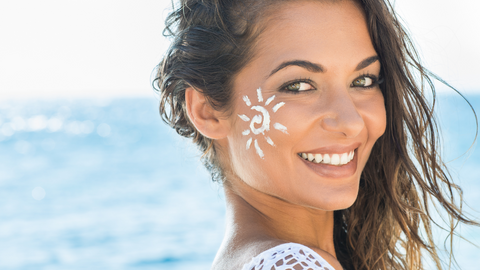Three things you need to know about sun damage to your skin

We all love sitting out in the sunshine soaking up the warmth of the rays - especially as sunny days seem all too infrequent here in the UK. But as we saw in our last post, sun worshipping comes at a price in the form of ‘photoageing’: premature ageing of your skin due to sun exposure. In today’s post, we’re going to look in more detail at the consequences of sun damage to your skin - but rest assured it’s not all doom and gloom: we’ll also be explaining what you can do about it!
1. Sun-damaged skin is about more than just sunburn

Sunburn isn’t a great look, and it’s uncomfortable - but it’s something we know that, at least on the face of it, will start to fade after two or three days. But there are longer-term consequences of sun damage to your skin that you need to be aware of, and they go beyond the red skin stage. If you’re consistently exposed to too much sun over a longer period of time, the damage can present itself in a number of ways:
- Dry, flaky skin - because the sun dries out your skin, it depletes its levels of the natural lubricating oils that keep it moisturised. The result: dry, flaky, wrinkled skin.
- A dull and uneven skin tone - when your skin has been damaged by the sun, the rate of cell renewal slows down. That means you end up with old, dead skin cells accumulating, giving your skin a dull appearance.
- Pigmentation - sun damage can cause freckles, brown age spots and other pigmentation marks that won’t go away.
- Spider veins and a ruddy complexion - this can occur due to collagen damage, which we’ll talk more about shortly.
- Actinic keratosis - also known as solar keratosis, this is a common condition resulting from years of sun damage. It’s a small, scaly growth that, although mostly harmless, can develop into cancer.
- Skin cancer - ultimately, chronic sun damage significantly increases your chances of developing melanoma and other forms of skin cancer.
All in all, sun damage is something best avoided.
2. The sun damages your collagen levels

As we saw in our last post, sun damage can be caused by two types of ultraviolet rays: UVB, which causes sunburn, and UVA, which penetrates deeper and damages the cells in your skin. It’s this that can damage the collagen and elastin in your skin - two proteins of which diminishing levels lead to the visible signs of ageing, such as fine lines and wrinkles.
These visible effects happen because the loss of these proteins causes your skin to lose its firmness and elasticity. So if you’re wondering whether the sun can really age your skin, the answer is yes - it really can! Of course, collagen breakdown happens with normal ageing too - particularly in women who’ve reached the menopause. But photo-ageing accelerates this process. UV radiation creates unstable oxygen molecules called free radicals, which among other harmful effects are responsible for a rise in the enzymes that deteriorate collagen.
3. There is something you can do about it
If you’ve got sun-damaged skin, it’s not all bad news. We’ve touched on the importance of collagen in the skin damage caused by the sun, but the good news is that taking collagen peptides can help to reverse that damage and leave you with smoother, suppler skin. At Proto-col, we recommend an ‘inside out’ approach, as collagen supplements can work highly effectively in conjunction with collagen skincare products to repair damaged skin by replenishing your collagen levels.
If you’re new to collagen, a great place to start would be our Pure Collagen and Complete Collagen supplements, which each contain a Bioactive Collagen Peptide® called VERISOL®. This is clinically proven to increase the elasticity of your skin by 15% after four weeks, and to decrease wrinkle volume by 20% after eight weeks of taking a daily 2,500mg dose - making it ideal for helping to reduce the appearance of the fine lines and wrinkles caused by sun-damaged skin.

Complementing these powerful supplements, our collagen skincare products are a great addition to your skincare regime. If you’re frustrated by dull skin thanks to too much sun exposure, try out our Collagen Facial Serum. It’s a blend of 20 high-performing plant extracts that combine to create a fantastic anti-ageing, skin-plumping treatment. Alternatively, opt for an overnight cream: our Intense Hydration Night Cream increases your skin hydration by a whopping 41%, making it a great way to restore sun-damaged skin.
Of course, by far and away the best way to combat sun damage is to prevent it in the first place. That’s where our Intense Protection Day Moisturiser comes in. It features plant collagen - which helps even out your skin tone, smooth out lines and wrinkles and moisturise your skin - but also hyaluronic acid and a host of other powerful plant extracts. Best of all, it provides SPF50 sun protection, shielding your skin from the sun’s harmful rays.

You’d be amazed at how many problems collagen can help you with - it’s not just good for repairing sun-damaged skin! To learn more, take a look at our post about collagen, and when you’re ready to take the next step, use our quick guide to help you work out which are the best collagen supplements for your needs.
Written by guest blogger Rachel Ramsay.

